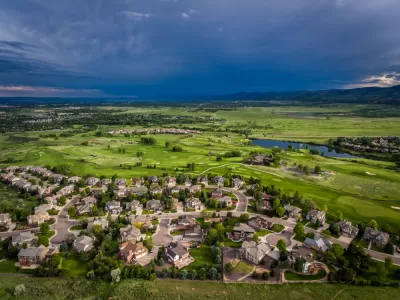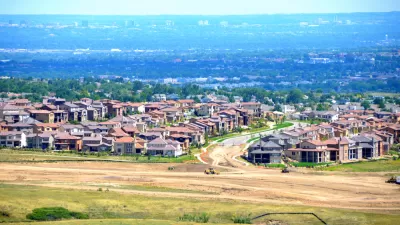Residents of the city of Lakewood have approved a ballot measure that caps annual residential development and requires City Council approval of all developments over 40 units.

"Voters in Colorado’s fifth-largest city on Tuesday approved a cap on residential construction that will be among the strictest in the metro area," reports John Aguilar.
Voters approved Question 200 with 53 percent of the vote, thus capping "the construction of new homes and apartments each year to no more than 1 percent of the existing housing stock in the city and would require City Council approval of large development proposals," according to Aguilar. According to Question 200, the "City Council must give explicit approval to any project that has at least 40 units."
Question 200 had a long route to the ballot box, clearing multiple legal hurdles before appearing before voters. The public approved the law despite most of the money spent on the campaign was devoted to defeating the measure.
Lakewood Mayor Adam Paul opposed Question 200, but most of the soundbites in the article are sourced from residents celebrating a victory.
Also voicing support for the vote, an opinion piece written a few days after voters approved Question 200 makes the case that the slow growth measures implemented by Question 200 will equal an effective climate action plan. Gary Wockner, the author of the opinion piece, hinges the argument on this paragraph:
Simple back-of-the-envelope math tells you that if you have less human consumers, you will have less population-caused GHG emissions. By slowing population growth, Lakewood will slow its GHG emissions — every city in Colorado could do the same thing, as could the state.
Wockner's argument in support of slow growth as a climate change mitigation measures has been directly refuted in the past.
FULL STORY: Lakewood voters pump brakes on home building, pass slow-growth initiative in special election

Study: Maui’s Plan to Convert Vacation Rentals to Long-Term Housing Could Cause Nearly $1 Billion Economic Loss
The plan would reduce visitor accommodation by 25,% resulting in 1,900 jobs lost.

North Texas Transit Leaders Tout Benefits of TOD for Growing Region
At a summit focused on transit-oriented development, policymakers discussed how North Texas’ expanded light rail system can serve as a tool for economic growth.

Using Old Oil and Gas Wells for Green Energy Storage
Penn State researchers have found that repurposing abandoned oil and gas wells for geothermal-assisted compressed-air energy storage can boost efficiency, reduce environmental risks, and support clean energy and job transitions.

Private Donations Propel Early Restoration of Palisades Playground
Los Angeles has secured over $1.3 million in private funding to restore the Pacific Palisades playground months ahead of schedule, creating a modern, accessible space that supports community healing after recent wildfires.

From Blight to Benefit: Early Results From California’s Equitable Cleanup Program
The Equitable Community Revitalization Grant (ECRG) program is reshaping brownfield redevelopment by prioritizing projects in low-income and environmental justice communities, emphasizing equity, transparency, and community benefits.

Planting Relief: Tackling Las Vegas Heat One Tree at a Time
Nevada Plants, a Las Vegas-based nonprofit, is combating the city’s extreme urban heat by giving away trees to residents in underserved neighborhoods, promoting shade, sustainability, and community health.
Urban Design for Planners 1: Software Tools
This six-course series explores essential urban design concepts using open source software and equips planners with the tools they need to participate fully in the urban design process.
Planning for Universal Design
Learn the tools for implementing Universal Design in planning regulations.
Ascent Environmental
Borough of Carlisle
Institute for Housing and Urban Development Studies (IHS)
City of Grandview
Harvard GSD Executive Education
Toledo-Lucas County Plan Commissions
Salt Lake City
NYU Wagner Graduate School of Public Service





























